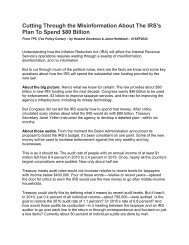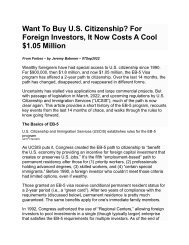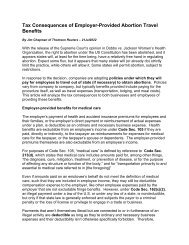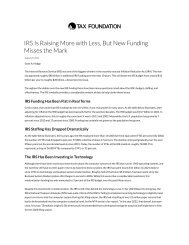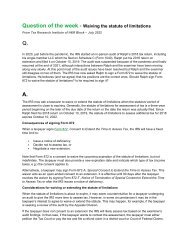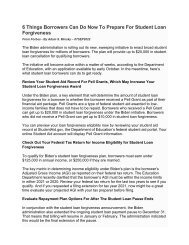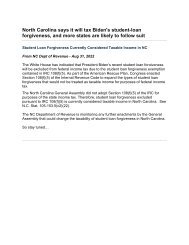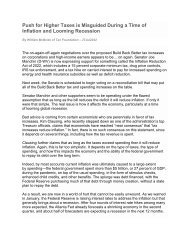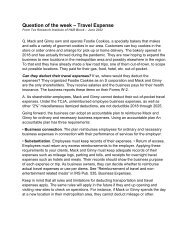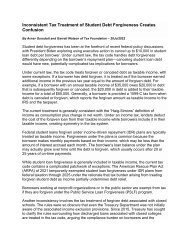US-taxes-for-international-students (1)
You also want an ePaper? Increase the reach of your titles
YUMPU automatically turns print PDFs into web optimized ePapers that Google loves.
<strong>international</strong> <strong>students</strong> are exempt from U.S. tax on payments from abroad and up to $9,000 in personal<br />
services income <strong>for</strong> <strong>students</strong> and business trainees.<br />
Example: Hans receives $2,500 <strong>for</strong> working in a lab as a research assistant in his third year of<br />
school. Under Article 20(4) of the U.S.-Germany Tax Treaty, these payments are exempt from U.S.<br />
tax as long as he receives less than $9,000 per year and isn’t present in the U.S. <strong>for</strong> more than four<br />
years.<br />
Special treaty rules <strong>for</strong> <strong>international</strong> <strong>students</strong> from Canada, China, and India<br />
The U.S.-Canada Tax Treaty is unique because it exempts all earned income <strong>for</strong> nonresident <strong>students</strong> if<br />
they don’t earn more than $10,000 in the tax year but allows the U.S. to tax all income if the nonresident<br />
earns more than $10,000 in the year. Also, Canadian <strong>students</strong> who become resident aliens lose this<br />
benet.<br />
Under the U.S.-China Tax Treaty, <strong>students</strong> who are residents of China <strong>for</strong> treaty purposes are exempt from<br />
certain payments including payments from abroad, grants, and up to $5,000 per year in personal services<br />
income. Nearly all U.S. tax treaties limit benets to a specic number of years and sometimes benets<br />
are lost when a taxpayer becomes a resident alien. Unlike other treaties, the provisions of the U.S.-China<br />
Tax Treaty are not limited by a number of years.<br />
Example: Mei is enrolled in medical school in the U.S. where she rst arrived as a student on Mar.<br />
13, 2018. Mei will remain in the U.S. <strong>for</strong> school until August of 2024 when she nishes her studies.<br />
Although Mei will likely be a resident alien <strong>for</strong> U.S. tax purposes in the sixth year (2023), she would<br />
still qualify to claim the treaty benets allowed to <strong>students</strong> under the treaty, assuming she still<br />
meets the denition of a student and the requirements of her visa.<br />
Under the U.S.-India Tax Treaty, Indian <strong>students</strong> are allowed a standard deduction on Form 1040NR equal<br />
to the amount allowed on Form 1040. They are also allowed a personal exemption <strong>for</strong> a nonworking<br />
spouse and U.S.-born children. While the TCJA suspends personal exemptions <strong>for</strong> tax years 2018 through<br />
2025, Indian <strong>students</strong> can still claim the standard deduction. However, they can only use the standard<br />
deduction <strong>for</strong> Single and Married Filing Separate taxpayers ($12,000 <strong>for</strong> 2018) because nonresidents<br />
can’t le a joint return on Form 1040NR.<br />
The rules <strong>for</strong> residency don’t apply to state return ling<br />
Depending on the nonresident alien <strong>students</strong>’ state, they may also be required to le state tax documents.<br />
The rules that apply to <strong>international</strong> <strong>students</strong> <strong>for</strong> U.S. federal income tax purposes don’t apply to statelevel<br />
residency determinations. Some states allow <strong>international</strong> <strong>students</strong> to exclude days <strong>for</strong> state<br />
residency purposes while others do not. Each state’s residency rules must be consulted to determine<br />
whether the <strong>international</strong> student must le a resident or a nonresident state return.<br />
Also, some states allow treaty benets on the state return. Depending on where the payment to the<br />
<strong>international</strong> student originates, income may be taxable on a state return and cannot be excluded by<br />
treaty.



